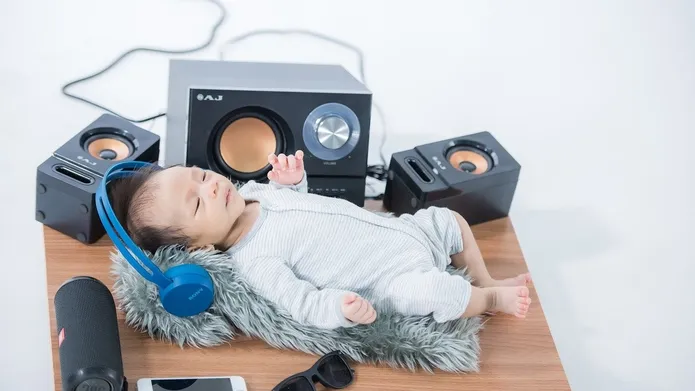Press release
Sweet dreams are made of this – happy songs send babies to sleep
Happy music makes newborn babies sleepy, according to new University of Dundee research showing for the first time that neonates can perceive and respond to different emotions in music.
Published on 19 December 2022

Happy music makes newborn babies sleepy, according to new University of Dundee research showing for the first time that neonates can perceive and respond to different emotions in music.
The study, led by Dr Emese Nagy, from the University’s Psychology department, demonstrates how music therapy can be used as a soothing or stimulating intervention from the very first days of life.
Dr Nagy and her colleagues carried out an analysis of the behaviour demonstrated in response to three different conditions – happy music, sad music, and no music – as well as measuring heart rate.
The researchers found that arousal levels decreased and sleep came faster when the babies were played happy music, but not when exposed to sad or no music. Eye movements decreased in both music conditions compared to the baseline, indicating that all music has a calming effect on this measure.
Movements associated with distress, such as leg stretching, were delayed when babies were played sad music while fine motor movement, toe movement, toe curling and finger movement were delayed longer in both the sad and happy music conditions than in the baseline.
Overall, happy music decreased the arousal levels of babies, shifting drowsiness to sleep, and resulted in longer delays in other forms of self-regulatory behaviour, such as sucking. Moreover, heart rate deceleration accompanied the decrease in arousal. In the sad music condition, relative ‘stillness’ and longer leg stretching latencies were observed, but no other measures were specific to it.
Dr Nagy said, “Music is often referred to as the language of emotions. People listen to music primarily because of its ability to arouse and regulate emotions, however, culture plays a major role in how we play and understand music.
“If culture shapes how we perceive music, newborns should not understand or react to emotions in it. Although evidence suggests that even babies respond to musical stimuli, the point where newborns accurately perceive the beat of music, that is when they start feeling emotions through music, has been unclear.
“Our results show that newborns do react to emotions in music, supporting the notion of a generic, possibly inborn, human musicality.”
The study aimed to investigate the effects of background music on healthy, full-term neonates’ behavioural and physiological responses using frame-by-frame analysis of their movements and heart rate.
It was hypothesised that if newborns are able to differentiate between happy and sad music, this might be reflected in movement and heart rate deceleration to sad music and acceleration to happy music, but the Dundee study found the results to be more complex.
The emotional content of the music used was validated via an experiment preceding the main study, where independent participants judged the emotional content of a large pool of children’s songs and lullabies.
A French lullaby entitled Fais Dodo was judged to be the saddest from the list while the well-known German children’s song, Das singende Känguru was rated as the happiest. Songs such as Hey Diddle Diddle, Humpty Dumpty and Little Miss Muffet were also considered among German, Italian, French children’s songs and lullabies, but were found to be neither as happy or as sad as the two selected to be played to the children in the study.
“We expected that newborns would respond differently to the two music conditions and to the control condition, but we were unsure whether there would be a different response to the two musical pieces,” continued Dr Nagy.
“We know that young children’s predominant response to music is movement, so the behaviour of the newborns was measured, as was their heart rate, during the three conditions.
“Traditionally, lullabies are sung by caregivers to soothe babies. Parents singing lullabies and personally relevant songs is a musically and emotionally congruent message and is likely to affect the young infant’s psychophysiology state long before the babies cognitively categorise and recognise the distinct emotional cues from faces and voices.”
Earlier studies carried out by Dr Nagy and colleagues had demonstrated the auditory and cognitive abilities of the foetus, and it is likely that regular musical input while in the womb, might shape the neonate’s responses to music.
The new research points to the possibility of using music therapy as a soothing or, if required, stimulating intervention in neonatal wards, including to counteract the distress of hospitalisation, as well as in home settings.
The paper is published in the journal Psychological Studies.